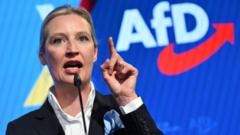This article explores five pivotal takeaways that illustrate Germany's evolving political landscape post-election.
**Key Insights from Germany's 2025 Election: Political Shifts and Rising Movements**

**Key Insights from Germany's 2025 Election: Political Shifts and Rising Movements**
The recent German elections highlighted significant political shifts, marked by the rise of the AfD and challenges for traditional parties.
The German elections of 2025 have incited rich discussions about the nation's political direction. With the conservative party lead by Friedrich Merz emerging victorious, the result marked a pivotal moment in which traditional party loyalties are being questioned, heralding a political atmosphere of significant change.
**Rise of the Alternative for Germany (AfD)**
The Alternative for Germany (AfD) has experienced substantial growth, doubling its support to 20.8% in just four years. Once primarily strong in the eastern regions, the party is expanding its influence into the western areas, signaling a dramatic shift in voter alignment toward its political stances, particularly on issues like migration and EU reform. The party's rhetoric surrounding "remigration" resonates with a growing section of the electorate, indicating a normalization of what many view as extreme ideologies. However, despite its significant support, the AfD remains excluded from the possibility of forming a coalition government due to a consensus among major parties to avoid alliances with organizations deemed extremist.
**Historic Voter Turnout**
Voter engagement reached heights not seen in over 40 years, with an impressive turnout of 82.5% of eligible voters participating. The increased interest highlights a politically energized populace, responding to a campaign landscape filled with numerous televised debates and discussions, signaling the election's critical nature at this historical juncture for Germany.
**End of an Era for Outgoing Leaders**
The election results trigger a notable dissolution of the previous coalition government, with leaders such as outgoing Chancellor Olaf Scholz, FDP's Christian Lindner, and Greens’ Robert Habeck all announcing their departure from frontline politics. Lindner's faction, failing to secure parliamentary representation, faces an uncertain future, while Scholz's exit reflects shifting party dynamics that demand new leadership moving forward.
**Resurgence of the Left Party**
Countering expectations, the Left party (Die Linke) managed to garner a vote share of just under 9%, revitalized by a compelling social media strategy. The party's co-chair, Heidi Reichinnek, leveraged platforms like TikTok to enhance visibility and influence among younger voters, securing a considerable proportion of the age group 18-24 years, showcasing the potential of digital engagement in modern politics.
**Distinct Voting Trends Among Generations**
Shifts in voting demographics revealed that younger voters are gravitating towards extremes, with significant support for both the AfD and the Left party, while older voters tend to favor centrist and conservative options. This generational divide indicates a growing ideological rift among the electorate, positioning the political future of Germany at a crossroads.
As Germany continues to navigate through these transformative political times, the implications of the 2025 election are expected to resonate deeply, shaping the future landscape of its governance and societal structures.
**Rise of the Alternative for Germany (AfD)**
The Alternative for Germany (AfD) has experienced substantial growth, doubling its support to 20.8% in just four years. Once primarily strong in the eastern regions, the party is expanding its influence into the western areas, signaling a dramatic shift in voter alignment toward its political stances, particularly on issues like migration and EU reform. The party's rhetoric surrounding "remigration" resonates with a growing section of the electorate, indicating a normalization of what many view as extreme ideologies. However, despite its significant support, the AfD remains excluded from the possibility of forming a coalition government due to a consensus among major parties to avoid alliances with organizations deemed extremist.
**Historic Voter Turnout**
Voter engagement reached heights not seen in over 40 years, with an impressive turnout of 82.5% of eligible voters participating. The increased interest highlights a politically energized populace, responding to a campaign landscape filled with numerous televised debates and discussions, signaling the election's critical nature at this historical juncture for Germany.
**End of an Era for Outgoing Leaders**
The election results trigger a notable dissolution of the previous coalition government, with leaders such as outgoing Chancellor Olaf Scholz, FDP's Christian Lindner, and Greens’ Robert Habeck all announcing their departure from frontline politics. Lindner's faction, failing to secure parliamentary representation, faces an uncertain future, while Scholz's exit reflects shifting party dynamics that demand new leadership moving forward.
**Resurgence of the Left Party**
Countering expectations, the Left party (Die Linke) managed to garner a vote share of just under 9%, revitalized by a compelling social media strategy. The party's co-chair, Heidi Reichinnek, leveraged platforms like TikTok to enhance visibility and influence among younger voters, securing a considerable proportion of the age group 18-24 years, showcasing the potential of digital engagement in modern politics.
**Distinct Voting Trends Among Generations**
Shifts in voting demographics revealed that younger voters are gravitating towards extremes, with significant support for both the AfD and the Left party, while older voters tend to favor centrist and conservative options. This generational divide indicates a growing ideological rift among the electorate, positioning the political future of Germany at a crossroads.
As Germany continues to navigate through these transformative political times, the implications of the 2025 election are expected to resonate deeply, shaping the future landscape of its governance and societal structures.



















